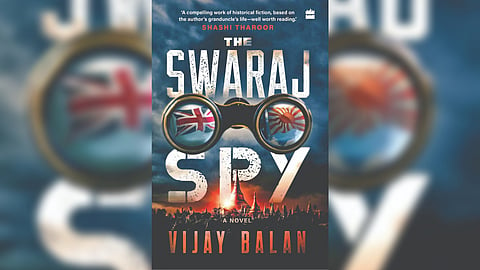

CHENNAI: In conversation with DT Next, the author of The Swaraj Spy, Vijay Balan talks about his debut book, writing process, research and lots more.
How does it feel finally having published your first book?
I feel elated for several reasons. It is the culmination of a 13-year journey of research, writing, editing and finding a publisher. I’m happy that the book has been brought to life by Harper Collins. But most of all, I’m happy that the little-known history of the espionage wing of the Indian National Army (INA), and the role played by the book’s protagonist, my grand-uncle TP Kumaran Nair in India’s freedom struggle has been brought to light.
What is the book about?
TP Kumaran Nair was an officer in the feared Malabar Special Police (MSP) that the British used to put down insurgencies. When he refused to follow an order to disperse women agitating for Indian independence, he gets dismissed from the force. After the Great Depression destroys his small business, he moves to Singapore to start a new life. World War II breaks out, and soon Singapore is captured by Japan. In Singapore, he meets people who convince him to join a spy school in Penang set up by the INA. When cadets from the school are betrayed by a double agent and captured by the British, Kumar is sent on a rescue mission. The book is about his rescue journey through Burma, trapped in a hall of mirrors where he cannot trust anyone. It is also about how the savagery of war can transform a human being, and how his wife deals with the pain of a husband missing behind enemy lines, in her own unique way.
Did you always want your first book to be historical fiction, or did it just happen?
The book is mostly based on researched facts. I have used fiction as a narrative vehicle to make the facts easily accessible to readers who like good storytelling. After all, history is really his-story (and her-story). I chose this approach to overcome the notion that many people have that history is a sterile subject made of dates and battles. The Swaraj Spy tells the tale of how global events and war affect the lives of ordinary people.
You mentioned that your late father TP Balan planted this story in your mind as a child. How did that happen?
The main character in the book was my father’s uncle. To my father, this man was a hero. As I was growing up, my father told me bits and pieces of the story. Those pieces kept floating around in my mind over the years until I decided to attempt to piece together the historical jigsaw puzzle.
How was the writing process like? Did you have to do extensive research?
The research and writing of the first draft took about 6 years. I started out with information from the family, including the study of letters written by Kumar. I also travelled to different parts of the world to meet people, examine documents and get a visual reference of the places I was writing about. I also did extensive reviews of YouTube videos to get an idea of what wartime Singapore or Rangoon looked and sounded like. My writing style is visual and I like to get my readers to see, hear and even smell what my characters are experiencing. All that took a lot of putting myself on the spot, so to speak, as I wove together the story threads. One piece of feedback that indicates that I may have connected with my readers, is when a reader in Belgaum told me he turned on the fan in his room after reading about hot, steamy Malaya!
Did you at any point have writer’s block? How did you overcome it?
It is important to recognise when your creative mind gets tired. That happens just like one’s body can get tired after exertion. So, I learned to stop writing before I hit a wall. I always removed myself physically from where I wrote to a place of natural beauty- a lake, a stream or a wooded path. I switched my mind away from the story and let the sights and sounds fill my mind space. Sometimes, those very sights and sounds crept back into my writing later.
What’s next for you? Is another book in the pipeline?
I have several ideas in mind for books of a similar nature- unveiling little-known history through evocative writing. The research I did for this book has turned up material that could perhaps be the subject of my next book. There are also other unrelated stories that I’m thinking about. I’ll sort through those options and decide on an approach perhaps later this year.
Available on all e-commerce platforms.
Visit news.dtnext.in to explore our interactive epaper!
Download the DT Next app for more exciting features!
Click here for iOS
Click here for Android